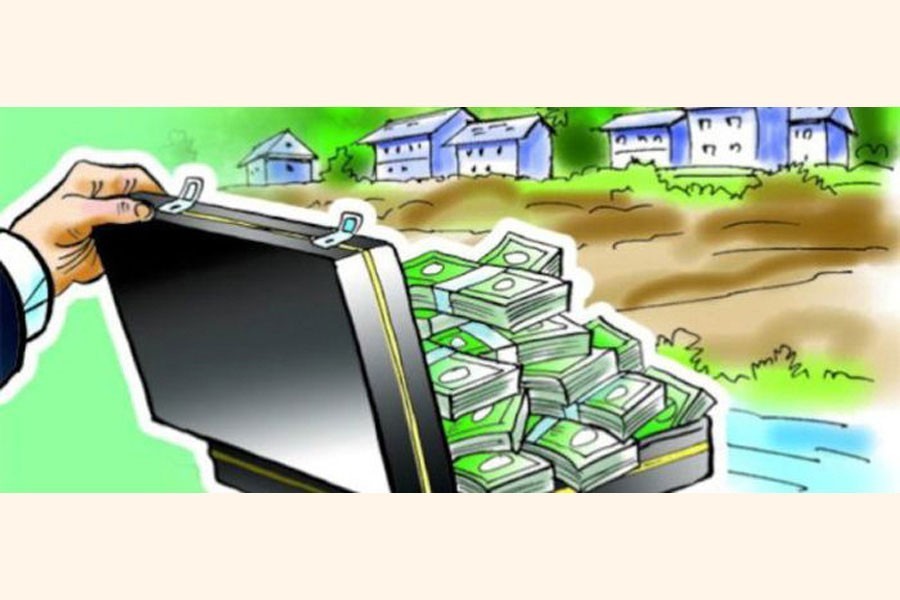The finance ministers in this part of the world have a habit of setting 'ambitious' revenue targets in the national budgets. No amount of criticism could deter them from doing so.
However, the world is now not the same it was three to four months back. An invisible enemy called novel coronavirus has taken the world by surprise. Most economies have gone into contraction. Future, in the short-term, also remains uncertain.
This is, in fact, not a time to think anything big. Managing survival through the exercise of austerity is the need of the hour for a country like Bangladesh. All are in agreement that this is an extraordinary time that calls for extraordinary measures. This is more true in the case of people who are in charge of state affairs, including the economic one.
The national budget proposals put forward by Finance Minister AHM Mustafa Kamal in parliament last Thursday do include a few measures that can be described as extraordinary, to some extent. The allocation of resources for building the health system's capacity to handle Covid situation better and expanding the safety net programmes to help protect millions from being trapped again in the vicious poverty circle are among such measures.
The finance minister at one point of his budget speech also described the present situation as an extraordinary one, but his budget turned out to be a conventional and ordinary one by its structure and content.
What has come as a big surprise to many is the finance ministry's obsession with fixing a very ambitious tax revenue target, that too, during this difficult time. The budget for the upcoming fiscal has a target to mop up tax revenue worth Tk. 3.30 trillion.
This is an impossible proposition under the given context. Yet the finance minister expects to achieve the target through tax-net expansion and easy tax-filing system. The incumbent chairman of the NBR while speaking at the post-budget news conference echoed the finance minister's stance.
Are tax-net expansion and the easy tax-filing system right answers to the problem of low tax mobilisation?
The NBR boss, however, said otherwise in a letter sent to the Ministry Finance at the time of budget preparation. He, reportedly, had requested the ministry to revise the tax targets downward for the current as well as the next financial years. The tax target for the current FY was revised once earlier. He had expressed the fear that the tax revenue receipt during the current fiscal (FY'20), for the first time in the history of the country, might be lower than the previous year. He projected the revenue collection in FY20 at Tk.2.20 trillion as against actual collection of Tk. 2.34 trillion in the previous fiscal.
As per historical tax revenue growth chart, the NBR chairman projected the possible tax revenue earning at Tk. 2.50 trillion in FY'21.
In the letter, he also noted that such ambitious target for tax revenue creates 'psychological pressure on taxmen and fuels allegations of harassment by taxpayers'.
Against this backdrop the finance minister has set a tax revenue target of Tk. 3.30 trillion for FY'21. The amount is Tk. 800 billion more than what was suggested by the NBR boss.
Moreover, the revenue target is also not compatible with tax concessions and waivers granted to individual as well corporate tax payers and businesses. Such benefits were necessary to provide relief to taxpayers in a difficult time like the present one, but its impact on revenue earnings should have been reflected in the tax target.
However, the NBR people, who are always at the receiving end when it comes to tax collection, have always tried to convince the finance ministry to be practical in setting tax revenue targets, but the latter continues to be stubborn on this issue as it is more interested in playing to the gallery. None knows for sure what remains in store in the upcoming fiscal. The virus has been moving around the globe with full vengeance. There is no sign of its weakening. So, pinning hope on an economic turnaround in the upcoming fiscal will not be that practical.
It seems the finance minister is banking on tax-net expansion and easy filing of tax return to achieve an otherwise tax revenue target for the next fiscal. Easy tax return filing might be a new thing, but there is no certainty that taxpayers will be extraordinarily motivated by the one-page form. The tax net expansion is an old issue. Only in the recent past tax men visited markets and shopping malls with a view to netting more taxpayers. The outcome is not yet clear. There is no denying that hundreds of thousands of people having taxable income have been evading payment of tax and they have been doing it with utmost ease.
The reasons behind tax evasion and poor tax-GDP ratio in the country are not unknown. What the tax system needs badly is introduction of large-scale reforms. There have been lots of discussions on the issue. Some reforms were initiated, but, in most cases, those fizzled out halfway. A section of taxmen and also taxpayers abhor reforms, for those hurt their interest. Unless and until reforms are in place the tax-GDP ratio in the country would continue to be far less than the actual potential.


